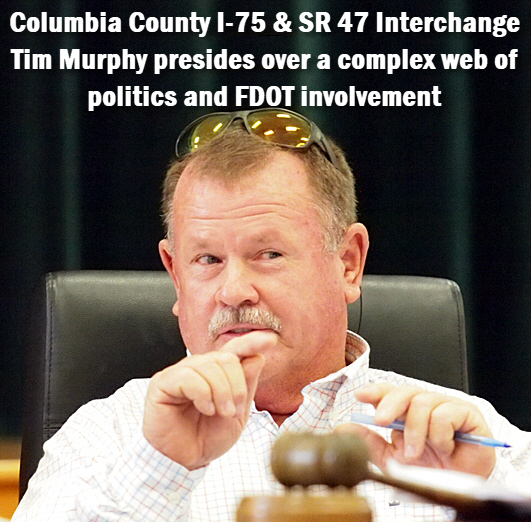Columbia County I-75 & SR 47 Interchange
Development, More Than Just About Publix: A
Complex Web of Politics & FDOT Involvement
September 2, 2025 11:59 pm | 3 min read | updated
Sept 3
9 comments

County 5 Chairman Tim Murphy presiding over a County
Commission meeting. (Columbia County Observer photo and
graphic)
The 3 minute version
COLUMBIA COUNTY, FL – The I-75 and State Road 47 interchange development has exposed controversial dealings involving a prominent developer, county officials, and the Florida Department of Transportation (FDOT). The controversy raises serious questions about government transparency, potential favoritism, and proper use of taxpayer funds.
Two Competing Projects
For years, two potential shopping center sites have been in development at the I-75 and SR 47 Interchange: one north of I-75 and one south of it.
The North-Side Plaza: Originally developed and co-owned by developer Scott Stewart and Charlie Sparks; later sold to RMC Property Group for $1.98M.
The South-Side Plaza: This project is now the focus of the same developer, Scott Stewart. He is trying to secure a Publix for this location and is asking Columbia County for financial help.
The Legal Drama
The north side project hit major obstacles when developers planned an entrance through Harmony Lane, the access road to the PineKnoll subdivision. Residents unanimously opposed this plan through a petition to County Commissioner Tim Murphy, who mysteriously never distributed it to other commissioners.
The situation escalated when it was discovered that resident Art Butler owned a crucial 50-foot strip of property that blocked the planned entrance. Westfield Investment Group sued Mr. Butler and his family in January 2022, but the case was dismissed with prejudice in July 2024 after RMC purchased the property in June.
The Controversial County Meeting
On August 21, 2025, County Commission Chairman Tim Murphy orchestrated what some would call a textbook example of "good ole' boy" politics during a County Budget Workshop.
Without any prior notice on the public agenda, County Chairman Tim Murphy and Assistant County Manager Kevin Kirby surprised everyone by announcing that developer Scott Stewart wanted to make a presentation to the Commission.
No backup materials were provided to the public, and those given to the Commission were apparently distributed just before the meeting.
Chairman Murphy didn’t bat an eye and allowed Scott Stewart to make a 41-minute presentation, which caught everyone off guard.
Mr. Stewart requested that the County use taxpayer money—approximately $588,000—to build a sewer lift station for his south-side plaza. He argued the project would create over 100 jobs and claimed the plaza's assessed value would exceed $25 million with a Publix. However, he admitted that Publix was not a "done deal" and that he only had a "backup in our mind" if they didn’t materialize.
During the meeting, it was revealed that Stewart's request had bypassed the normal procedure, including a review by the County Economic Development Advisory Board (EDAB), which uses a scorecard to vet such projects.
Despite years of development, the project was still presented as urgent.
FDOT’s Role
The Florida Department of Transportation's involvement raises additional concerns about preferential treatment.
Commissioner Murphy admitted to meeting with FDOT about the interchange without authorization from the full County Commission. He also pushed for Stewart's project, citing Stewart's "timeline" and difficulties with getting state grants.
Mr. Murphy was accompanied at DOT by Assistant County Manager and political operative Kevin Kirby. The County Manager was not advised of this meeting.
Mr. Murphy and Mr. Kirby revealed a critical piece of information from their FDOT meeting. After Stewart's project, the next developer at the interchange would be required to pay for $12 million to $15 million in road and traffic upgrades. Mr. Stewart confirmed his project would not face these massive costs.
This creates a significant financial barrier for any potential competitor, including the new owners of the north-side property, effectively giving Mr. Stewart an unfair monopoly on development.
The Big Picture
The situation is more than just a debate over a supermarket and competing shopping centers.
It has evolved into a case study of how local politics, developer relationships, and government transparency issues can complicate economic development—with taxpayers footing the bill for private profit.
Did the developer use political connections to secure public funding and a favorable regulatory landscape from FDOT, all while sidestepping standard county procedures and transparency?
Are local and state officials playing favorites at the expense of fair competition and taxpayer funds?
Make yourself a cup of coffee and read the whole story here.
